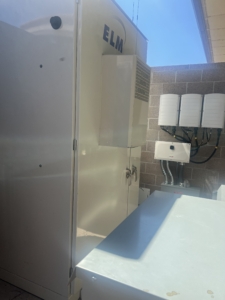SOU expands solar and energy resilience footprint
(Ashland, Ore.) — Southern Oregon University has embraced its role as an energy resilience leader in the region – supporting both the SOU community and the surrounding community – by completing two new solar arrays and installing its first battery system for energy storage. The moves edge SOU closer to its goal of generating 100% of the daytime electricity needed on campus.
The two most recent arrays – at Lithia Motors Pavilion and The Hawk Dining Commons – added a total of 402 kW (241.2 Lithia and 160.9 Hawk) of capacity and include SOU’s first battery-based storage system, providing both renewable generation and resilience benefits.
 The projects were installed by Ashland-based contractor True South Solar as part of SOU’s first round of funding from the Oregon Department of Energy Community Renewable Energy Program. Additional support for the Hawk projects came from SOU’s Student Green Fund and a state sustainability allocation for its four technical and regional universities.
The projects were installed by Ashland-based contractor True South Solar as part of SOU’s first round of funding from the Oregon Department of Energy Community Renewable Energy Program. Additional support for the Hawk projects came from SOU’s Student Green Fund and a state sustainability allocation for its four technical and regional universities.
“It was great to work with local solar installer True South Solar on such significant project for SOU – the largest solar array in City of Ashland (on Lithia Motors Pavilion) as well as SOU’s first battery energy storage system,” said Becs Walker, SOU’s Director of Sustainability. “True South competitively bid for the contract and have installed a number of arrays on campus.”
Walker said the most recent projects “focus on strengthening emergency response infrastructure,” as SOU works with the city of Ashland, the Ashland School District and Jackson County to plan for potential disasters or crisis events.
“We are positioning SOU as a leader in energy and community resilience,” she said.
Walker, True South Solar representatives, facility management employees and economics faculty member Bret Anderson – who also serves as research director for SOU’s Institute for Applied Sustainability – conducted a recent test of the new solar and energy-storage facilities at The Hawk Dining Commons. External power to the building was shut down, and the dining hall’s basic components – lighting, one cooler and one cooking area – instantly powered back up by drawing from the solar array. The energy storage batteries will power the same essential components through the nighttime hours.
SOU now has 10 solar arrays on its campus, totaling 804.21 kW of capacity, in addition to one array on the Higher Education Center in Medford and six pole-mounted STrackers located on land leased to a nonprofit. Three of the on-campus arrays support net-zero buildings, underscoring SOU’s commitment to deep decarbonization and long-term energy savings.
SOU has been awarded $5.8 million in state and federal funding in recent years to support energy generation and energy resilience on campus – three $1 million grants from the state’s Community Renewable Energy Program, a $2 million congressional appropriation and $800,000 through an allocation from the Oregon Legislature for Sustainability Funding at Oregon’s Technical and Regional Universities.
Part of the $2 million federal appropriation will be used this year launch a new Community Resilience and Leadership (CRL) Student Fellows Program – the flagship curricular initiative of SOU’s Institute for Applied Sustainability (IAS). The fellowship program is being developed in partnership with academic programs and departments across campus to link the university’s solar infrastructure with its academic offerings around sustainability. It will prepare emerging leaders from all majors to strengthen communities and respond to the challenges of wildfire, extreme heat, smoke and other climate-related disruptions.
The year-long student fellowships will combine coursework, field experience and career pathways, and will offer mentorship, professional skill development, experience working on regional challenges and stipends to support students’ participation.
-SOU-







 Recent potato plantings marked a significant step toward fulfilling the summer 2024 CSA Program, a cornerstone initiative of the farm, with crops that have over-wintered now approaching harvest. The CSA program yields high-quality, pesticide-free produce and fosters community engagement by offering subscribing members weekly access to fresh fruits and vegetables grown on The Farm.
Recent potato plantings marked a significant step toward fulfilling the summer 2024 CSA Program, a cornerstone initiative of the farm, with crops that have over-wintered now approaching harvest. The CSA program yields high-quality, pesticide-free produce and fosters community engagement by offering subscribing members weekly access to fresh fruits and vegetables grown on The Farm.


